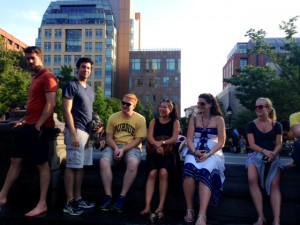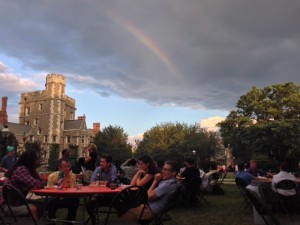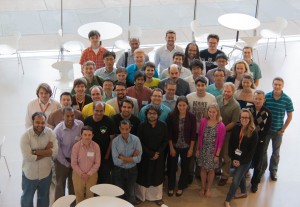NPWG member and UC Berkeley Nuclear Engineering PhD student Alexandra (Sasha) Asghari attended the 2014 International Summer Symposium on Science and World Affairs at Princeton University. The Symposium was held July 25th-August 1st and organized by the Union of Concerned Scientists, partially funded by the Carnegie Corporation of New York, and sponsored by the Program on Science and Global Security at the Woodrow Wilson School of Public and International Affairs at Princeton University and the Union of Concerned Scientists. More information about the Summer Symposium can be found here: http://www.ucsusa.org/nuclear_weapons_and_global_security/summer-symposium/.
The Summer Symposium was truly a unique opportunity for me to meet part of the passionate, dedicated arms control and nonproliferation community (that I didn’t even realize existed). I very much look forward to seeing my new friends throughout my career.
The Symposium lasted six days and was comprised of roughly fifty participants, the large majority of which were students or young professionals. Each participant was expected to do two things: attend every lecture and give a lecture. What a wonderful idea! Because of this democratic organization, I very much felt like I was participating in a community of like-minded individuals instead of just passively listening to lectures.
So, what did everyone talk about? Well, the main focus of the Symposium was closely tied to the Union of Concerned Scientists’ mission of using science and technology to solve the planet’s most pressing problems. One such problem, and the central theme of the talks, was nuclear nonproliferation and arms reduction. Coming from a specific scientific niche within the scope of nonproliferation, I hardly realized what a diverse set of fields nuclear nonproliferation and arms reduction comprise. My mind was opened to areas including space debris, the chemistry behind reprocessing, missile defense, game theory, open source software for arms control, antineutrino reactor monitoring, systems engineering, zero-knowledge verification, virtual warhead disassembly, and the list goes on and on.
The interdisciplinary nature of the talks was delightfully surprising. For example, Moritz Kütt, a physics PhD student at Darmstadt University of Technology discussed open-source software that he is developing for nonproliferation. His knowledge of physics, programming, and policy unites with his belief in transparency and open-source software in a unique and incredibly relevant project.
As fascinating as each of the talks were, the people giving the talks were even more interesting. It’s difficult as a PhD student who spends all of her time in a lab or in front of a computer to really appreciate the wonderful, passionate community of which I am part. First of all, I have to mention that most talks were presented on work done outside of the speaker’s normal job or dissertation topic (and were obviously a large extracurricular work load). Despite the added workload of presenting a lecture on a topic outside of one’s research area, each speaker’s passion for their research shone through the enthusiasm of their voice and the glint in their eye.
The international nature of nonproliferation and arms control was reflected in the long list of countries from which participants came. There were participants from China, India, Germany, Pakistan, Russia, and Budapest. The Symposium brought the participants together to focus on one shared passion, instead of the often divisive differences among nations. The ability to find common ground among people of diverse backgrounds is a major benefit of large-scale scientific endeavors.
Of course, not all of the fun was had inside of the lecture hall. There were nightly shenanigans involving the quaffing of some delectable local nectar. Some nights, we played charades (which included about nine Putin impressions one night!). Another night we went to a Princeton professor’s house for a light dinner, and ended up dancing the night away with said professor DJ’ing on his excellent analog stereo system.

We were taken on an excursion to New York City during a free day and had amazing fun. Here is part of the group after an excursion to the Statue of Liberty.

We met for a hosted dinner every night, which gave us a chance to have great conversations and debates. This particular dinner was a BBQ held in the center of Princeton.
Last but certainly not least, I would like to thank David Wright and Teri Grimwood for inviting me to and organizing the best symposium I have ever attended. Because of their facilitation, I have made friendships that will last my entire career.


